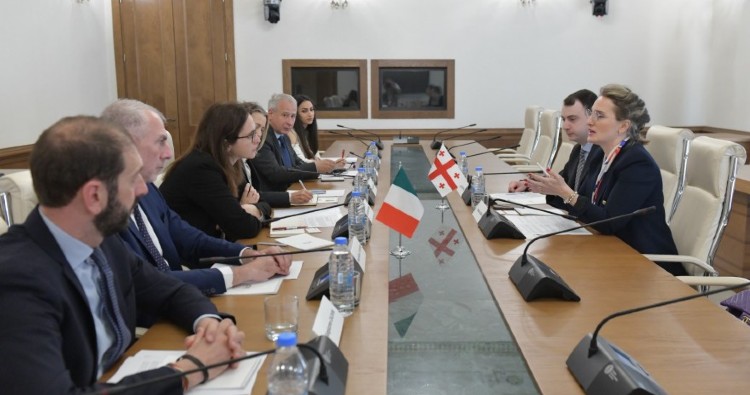Georgian MPs, Italian Parliament delegation discuss transparency law, Venice Commission opinion

In a meeting with the visiting delegation, Lashkhi also claimed there was “no healthy, legitimate and substantive discussion” on the law from the domestic opposition and civil sector. She alleged the groups did “not engage in a substantive discussion” and claimed the circumstance was “also notable from the President’s veto”, in reference to the veto placed on the law after its adoption by Salome Zourabichvili on Saturday. Photo via
The controversial Georgian Law on Transparency of Foreign Influence, adopted by the country’s Parliament on May 14, and the conclusion of the Venice Commission of the Council of Europe on the legislative piece were discussed on Wednesday in a meeting between Mariam Lashkhi, the First Deputy Chair of the Foreign Relations Committee of the Georgian Parliament, Committee member Giorgi Chakvetadze and delegation of the Foreign and European Union Affairs Committee of the Parliament of Italy.
The Georgian Parliament said the meeting also highlighted bilateral relations and a further strengthening of the cooperation in economic diplomacy, Georgia’s European integration process, security challenges in the region, upcoming parliamentary elections in Georgia and the pre-election environment in the country.
In the meeting, Lashkhi named “disinformation” as a “major challenge” for upcoming elections around the world.
We had the discussion and made explanations on why it was necessary to initiate the bill [on transparency]. Especially when there are 25,000 non-governmental organisations in the country which, according to the formerly existing law, had no transparency obligations”, she said in reference to the newly adopted law’s requirement for declaration of sources of funding of subject organisations.
In a meeting with the visiting delegation, Lashkhi also claimed there was “no healthy, legitimate and substantive discussion” on the law from the domestic opposition and civil sector. She alleged the groups did “not engage in a substantive discussion” and claimed the circumstance was “also notable from the President’s veto”, in reference to the veto placed on the law after its adoption by Salome Zourabichvili on Saturday.
The Parliament last week adopted the law, which requires groups “considered to be an organisation pursuing the interests of a foreign power” - determined by more than 20 percent of their funding coming from abroad - to be registered in the public registry with the status and publicise their received funding.
The legislative piece was supported by 84 MPs in the 150-member lawmaking body, with 30 voting against.
Zourabichvili vetoed the law on the backdrop of ongoing public protests against the law and criticism from Georgia’s foreign partner states.
The Venice Commission published its urgent opinion on the law, which said “fundamental flaws” of the legislative piece would involve “significant negative consequences” for the freedoms of association and expression, the right to privacy, the right to participate in public affairs, as well as prohibition of discrimination in the country.
 Tweet
Tweet  Share
Share